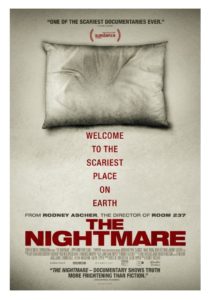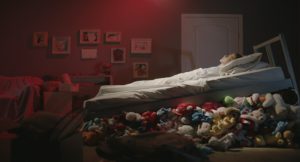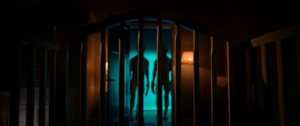 There have a been a couple of moments in my life where I have truly been frightened by an event that took place, which at the time and to this day, I have not been able to explain. There have been plenty of rational explanations I have thrown around in my mind to render the mystery null, but all of them have been as provable as the “supernatural” explanation: ghosts, forces, spiritual evil, etc. The problem of absolute certain proof is that the thing that happened would have needed to be examined in the moment and I was either too young and scared or it happened so fast that by the time it happened, it was too late to examine it.
There have a been a couple of moments in my life where I have truly been frightened by an event that took place, which at the time and to this day, I have not been able to explain. There have been plenty of rational explanations I have thrown around in my mind to render the mystery null, but all of them have been as provable as the “supernatural” explanation: ghosts, forces, spiritual evil, etc. The problem of absolute certain proof is that the thing that happened would have needed to be examined in the moment and I was either too young and scared or it happened so fast that by the time it happened, it was too late to examine it.
So, as it stands, the rhythmic footsteps on the wooden stairs at my granny’s old house at night–on several occasions–and the random slam on the front door of my psychic aunt’s house during a normal conversation–that happened once–are simply in the ambiguous realms of ‘mystery,’ neither confirmed material or immaterial causes.
Do I consider myself someone who looks for the supernatural/spiritual explanation all the time when strange things happen? No, not really at all. Do I consider myself someone who believes in the supernatural/spiritual realms? Yes, very much so. And I think there are many people that would fall into this tension along with me. Granted, there are people who are harder to believe because they have a track record of automatically jumping to those explanations without considering more “earthly” modes of reasoning. However, I really do not believe they are in the majority of people on this planet. I think most people live in this tension, like I do, or they refuse any supernatural/spiritual mode of explanation. Period.
This is the realm within which the 2015 documentary, The Nightmare, comes into play. Now, from the outset, I won’t say this film is great, or even necessarily good, but it accomplished something because I was unsettled after finishing it. I hesitated before turning out the lights, I looked over my shoulder occasionally and I had to listen to something funny to take my mind off it so I could go to sleep.
I slept like a baby. No harm, no fowl.
 The documentary explores the topic of sleep paralysis which, medically-speaking, has been attached to numerous ailments like sleep apnea and narcolepsy, among others. It’s a moment in the act of falling asleep or waking up where a person is unable to move, respond, or react because of muscle atonia (a weakening of the muscles). However, the documentary focuses on those people who have experienced rather disturbing phenomena during sleep paralysis. One of the phenomena that came up quite often between the multiple people, in multiple cities/countries, was the image of the shadowy figure that came into their room, sometimes got on their bed and/or talked/screamed at them while they were unable to move or speak. There were many elements that were shared across the board, but, also, just as many unique characteristics that filled out the experiences of each person interviewed.
The documentary explores the topic of sleep paralysis which, medically-speaking, has been attached to numerous ailments like sleep apnea and narcolepsy, among others. It’s a moment in the act of falling asleep or waking up where a person is unable to move, respond, or react because of muscle atonia (a weakening of the muscles). However, the documentary focuses on those people who have experienced rather disturbing phenomena during sleep paralysis. One of the phenomena that came up quite often between the multiple people, in multiple cities/countries, was the image of the shadowy figure that came into their room, sometimes got on their bed and/or talked/screamed at them while they were unable to move or speak. There were many elements that were shared across the board, but, also, just as many unique characteristics that filled out the experiences of each person interviewed.
The most compelling aspect of the documentary is the nature of subjective human experience. For those who are materialists/empiricists, any human experience that involves something that is immaterial or supernatural must find its explanation in a material cause and effect. I would be willing to say that many human experiences of the supernatural variety probably do have a materialist explanation. Even the two experiences I have had may have perfectly sensuous explanations, but what documentaries like The Nightmare should challenge us to consider is how objective those subjective experiences of something supernatural/spiritual become to those who honestly claim to have had them.
Each of those people who were interviewed–given that they are truly honest about their experiences–believe them to be true, just like I truly believe my own experiences to be true and allow those experiences to shape my character and my being in this world.
 One woman interviewed in the documentary had terrifying experiences with these shadowy beings during sleep paralysis and found herself calling upon the name of Jesus–in that moment, quite seriously–and, according to her, it ended, at least that night if not longer. She became a Christian sometime after seeing what she perceived to be the power behind the name of Jesus and the objective person and truth claims behind the name. From a human perspective, her experience led to her shifting belief paradigm. Her subjective experience led her to the Christian faith.
One woman interviewed in the documentary had terrifying experiences with these shadowy beings during sleep paralysis and found herself calling upon the name of Jesus–in that moment, quite seriously–and, according to her, it ended, at least that night if not longer. She became a Christian sometime after seeing what she perceived to be the power behind the name of Jesus and the objective person and truth claims behind the name. From a human perspective, her experience led to her shifting belief paradigm. Her subjective experience led her to the Christian faith.
It is very possible that her experience in that moment had a purely physiological explanation. Would that change the effect of the experience on her? Very doubtful. People are shaped by their experiences. They, for better or worse, provide the lens in which we view all things. No one is without the lens of experience and presuppositions about the world which interpret “reality” for us. So while atheists and theists can debate the metaphysical existence of non-material beings or things and never come to an absolute proof on either side, our individual experiences often do the heavy lifting of deciding the pathways we travel down in this world.
It really comes down to what authority we claim as our means of interpreting our subjective experiences. Atheists/agnostics look to their senses and our mind’s ability to reason as their authority in interpreting their experiences and reality while theists, more specifically Christians, see Scripture and tradition–in varying balance depending on the branch–as the authority in which they interpret their experiences and reality. Christians do this because they believe that their senses, reason, experiences are inherently flawed and not completely trustworthy.
Christians do not always look for the spiritual/supernatural as the primary or even key explanation. We use our senses and our minds as tools, like everyone else, even though we believe they are not perfectly calibrated to see objective actuality. They do give us information that we base life on, opinions on, our understanding of nature, etc. But, I think, the challenge that is presented to people who only believe in the material/sensuous world by narratives like those presented in The Nightmare is what are the experiences and presuppositions that cause them to outright deny real, honest experiences told to them by others. One would have to assume a place of superiority and perfection to claim their perspectives and experiences are untainted by their past, irrational emotional input, personal vendettas, etc. Trust me, I am a member of a faith that has often fallen into this trap in the past 2,000+ years.
 While I, too, am skeptical of some of the narratives in The Nightmare, I choose to let them be heard and struggled with in my head and heart rather than decreeing their falsity right out. I do believe in a spiritual/supernatural realm. I do believe things like this could happen. I don’t believe every person’s experience can and should be explained by something supernatural. I do, however, believe that if it is an honest experience had by the person, then it is, for all intents and purposes, very objective to their view on the world and I must take that seriously before I judge them.
While I, too, am skeptical of some of the narratives in The Nightmare, I choose to let them be heard and struggled with in my head and heart rather than decreeing their falsity right out. I do believe in a spiritual/supernatural realm. I do believe things like this could happen. I don’t believe every person’s experience can and should be explained by something supernatural. I do, however, believe that if it is an honest experience had by the person, then it is, for all intents and purposes, very objective to their view on the world and I must take that seriously before I judge them.
Experiential information is potent and important to life. On the very lowest level, the experience of touching a hot oven burner will teach us to, rightly, not touch a hot oven burner otherwise we get hurt. This goes for much more difficult subjects as well. Maybe if someone has an honest experience where they witnessed something supernatural, then it may just be showing that person something more real maybe than what our senses and mind could tell us. People all over the board understood the limits of human senses and minds from H.P. Lovecraft to G.K. Chesterton and so many more. It’s actually rather intelligent to believe in and be cognizant of human limitations.
So, while I wouldn’t give the documentary terribly high marks, it does do two things quite well: it actually kind of freaked me out which is very hard to do and it presents a compelling correction to those in the world that dismiss supernatural/spiritual experiences that do not fit within their belief systems while their very own perspectives are inevitably constructed by experiences that may or may not be skewed by inaccurate memory, emotion, or any number of things.
 Moral of the story: when people tell you about their experiences, no matter what they consist of, respect them enough to hear them out and wrestle with the content of that experience. Take their experiences as seriously as they do before you swing that gavel down. It really is the least you could do. And you might find that the work of empathy may just expand your world beyond the merely material and deliver you into a world less safe and controllable.
Moral of the story: when people tell you about their experiences, no matter what they consist of, respect them enough to hear them out and wrestle with the content of that experience. Take their experiences as seriously as they do before you swing that gavel down. It really is the least you could do. And you might find that the work of empathy may just expand your world beyond the merely material and deliver you into a world less safe and controllable.


